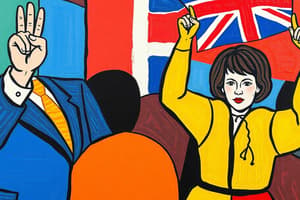Podcast
Questions and Answers
Which of the following is an argument against Proportional Representation (PR) in electoral systems?
Which of the following is an argument against Proportional Representation (PR) in electoral systems?
- Fairer representation
- Weak governments (correct)
- Greater voter choice
- Increased voter turnout
Referendums are always appropriate for resolving complex issues.
Referendums are always appropriate for resolving complex issues.
False (B)
Name one of the main functions of a political party.
Name one of the main functions of a political party.
Represent interests
The Labour Party emerged in the 1900s, championing _________ rights and welfare.
The Labour Party emerged in the 1900s, championing _________ rights and welfare.
Match the following elections with their key outcome:
Match the following elections with their key outcome:
Which of the following is NOT a typical method of political participation in the UK?
Which of the following is NOT a typical method of political participation in the UK?
The Magna Carta, signed in 1215, expanded the voting rights to all citizens in the UK.
The Magna Carta, signed in 1215, expanded the voting rights to all citizens in the UK.
What does FPTP stand for in the context of the UK electoral system?
What does FPTP stand for in the context of the UK electoral system?
The Human Rights Act was introduced in ______.
The Human Rights Act was introduced in ______.
Match the following types of democracy with their description:
Match the following types of democracy with their description:
Which of the following is a characteristic of insider pressure groups?
Which of the following is a characteristic of insider pressure groups?
E-democracy primarily decreases accessibility to political engagement for most citizens.
E-democracy primarily decreases accessibility to political engagement for most citizens.
What is a key criticism of the First Past the Post (FPTP) electoral system?
What is a key criticism of the First Past the Post (FPTP) electoral system?
Flashcards
Proportional Representation (PR)
Proportional Representation (PR)
A system where voters choose representatives from a list based on party vote proportions, ensuring representation is more reflective of the electorate's views.
Referendum
Referendum
A direct vote by citizens on a specific issue, often involving a yes/no choice. This bypasses elected representatives and allows the public to have a direct say on major decisions.
Political Parties
Political Parties
Organizations that seek to gain political power through elections. They represent specific interests, develop policies, and organize campaigns.
Factors Affecting Voting Behaviour
Factors Affecting Voting Behaviour
Signup and view all the flashcards
Media's Role in Elections
Media's Role in Elections
Signup and view all the flashcards
Democracy
Democracy
Signup and view all the flashcards
Direct Democracy
Direct Democracy
Signup and view all the flashcards
Representative Democracy
Representative Democracy
Signup and view all the flashcards
E-Democracy
E-Democracy
Signup and view all the flashcards
First Past the Post (FPTP)
First Past the Post (FPTP)
Signup and view all the flashcards
Franchise
Franchise
Signup and view all the flashcards
Pressure Groups
Pressure Groups
Signup and view all the flashcards
Democratic Deficit
Democratic Deficit
Signup and view all the flashcards
Study Notes
Democracy and Participation
- Democracy is a system where citizens hold power, making decisions directly (referendums) or via elected representatives.
- UK participation includes voting, protests, petitions, political party involvement, and social media engagement.
- Voter turnout has decreased slightly since the 1990s, but digital activism has increased.
- Key UK democratic milestones include the Magna Carta (1215, limiting monarchal power), Reform Acts (expanding voting rights), and devolution (granting power to regions).
- E-democracy utilizes internet tools, but raises concerns about misinformation and online security.
- The UK voting franchise expanded from wealthy men to universal suffrage (1928). Current debates include lowering the voting age and implementing voter ID laws.
- The UK system has strengths (free elections, diverse participation) and weaknesses (low turnout, disproportionate representation, and elite group influence).
Pressure Groups
- Pressure groups work to advance specific interests through lobbying or protest activities.
- Insider groups work with the government, whilst outsider groups use protests as means of influence.
- Pressure groups amplify voices but may lack accountability.
Rights and Protection
- Rights are protected by UK laws including the Human Rights Act (1998) and the Equality Act (2010).
- Conflicts can arise between individual and collective rights.
Democratic Issues
- The UK faces a "democratic deficit" with low voter turnout, and issues with representation under the first-past-the-post (FPTP) system.
- There is a participation crisis, with youth turnout declining.
Electoral Systems
- The UK uses the FPTP system, which elects MPs based on a simple majority. Critics point to its tendency for disproportionate outcomes.
- Reform arguments center on the move to proportional representation (PR) which seeks to distribute seats more proportionally to the votes cast, leading to fairer representation. This is countered with concerns over potential instability and reduced constituency links.
- Referendums are used for major decisions like Brexit. They allow for public input but can simplify complex issues leading to misinformation risks.
Political Parties
- Political parties represent interests, create policies, and organize elections.
- Party funding comes from memberships, donations, and public subsidies. Issues arise relating to the risk of corruption and unequal influence, particularly for large donations.
- Major UK parties include the Conservative Party (historically the Tory Party), the Labour Party, and the Liberal Democrats. Each has specific historic origins and policy positions.
Voting Behaviour and the Media
- UK election case studies, like 1945 (Labour's landslide), 1997 (Blair's victory), and 2019 (Johnson's win), highlight significant shifts in political power.
- Voting behavior is influenced by class (though less so than previously), age (youth leaning Labour, elderly leaning Conservative), region (rural areas favoring Conservatives, urban areas leaning Labour), and the media (which powerfully shapes opinions and campaigns).
- The media plays a crucial role in shaping public opinion. Concerns include media bias and the spread of misinformation.
Studying That Suits You
Use AI to generate personalized quizzes and flashcards to suit your learning preferences.




